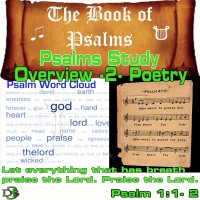

Read: Psalm 1:1-2 |
What happened to the original music that accompanied the Psalms, such as Psalms 9,22, and others? What did these songs sound like? Don’t we need them to really appreciate the lyrics to these hymns?
Although, the original music to the songs in Psalms is lost, the lyrics are not. The advantage of this is that we are free to connect “our” own music to the Psalms. Consequently, we can truly experience the Psalms spiritually, intellectually and emotionally in the way they were intended.
Let us continue our overview this week and review distinctive points about this book which teaches us to worship God.
Why is Psalms called a book of Poetry?
The books of Job, Psalms, Proverbs, Ecclesiastes, and the Song of Solomon form the Books of Poetry. Each book serves a distinct purpose:
- Job is the cry of man needing faith and trust in God; it offers us comfort and guidance during times of intense suffering brought on by loss
- Psalms is the book of emotions; it expresses the deepest spiritual and emotional needs of man and his heart
- Proverbs is the book of the will; it offers practical wisdom for everyday living
- Ecclesiastes is the book of the mind; it offers guidelines for godly living in a crooked and perverse world
- The Song of Solomon is the cry of the body for love; it offers direction when facing the challenges of courtship and marriage
The poetry in the Psalms do not match the rhyme and meter that we might have learned in school. Hebrews poets did not limit their art form to our familiar styles. Instead, they wrote in a lyrical free verse of “thought rhyme” versus “word rhyme”. Subsequently, the Psalms strike the chords of our hearts and minds by using figurative expressions and parallelism.
Think about it, even with modern poetry in Spanish or English, rhyme and rhythm cannot be translated into another language without losing something from the original language. However, because the Hebrew poets did not focus on rhyming words, very little is lost in translating word-for-word into our native tongue. Once again, the inspired word of God transcends time, culture and language to reproduce its effect in us as initially intended.
In “Reflections on the Psalms”, C. S. Lewis emphasized the importance of studying the Psalms as Hebrew poetry, with its unique forms and characteristics. He wrote:
What must be said … is that the Psalms are poems, and poems intended to be sung: not doctrinal treatises, nor even sermons. … Most emphatically the Psalms must be read as poems; as lyrics, with all the licenses and all the formalities, the hyperboles, the emotional rather than logical connections, which are proper to lyric poetry. They must be read as poems if they are to be understood; no less than French must be read as French or English as English. Otherwise we shall miss what is in them and think we see what is not.
The Psalms provide us not only with a passage to ponder and to pray, but also with a pattern for our prayer, worship and spiritual songs. Martin Luther found the Psalms to be a school of prayer: “The Christian can learn to pray in the psalter, for here he can hear how the saints talk with God. The number of moods which are expressed here, joy and suffering, hope and care, make it possible for every Christian to find himself in it, and to pray with the psalms.”
If the Psalms are a pattern for our worship, our prayer, and our praise, then it is my hope that our study of the Psalms will make of us better worshippers, more skillful and faithful than we have ever been before in prayer and in praise. For with more prayer and praise, God’s power in us is manifested.
Questions:
1. Discover –
A. This week, pick a Psalm and read it, hum it, sing it a few times. Please try it with me!
B. What was your experience from trying the above? For me, I felt filled and thrilled. I started repeating key phrases as if saying it once didn’t get my point across.
2. Develop –
A. Some of the Psalms are praise and some are lament and others contain every other emotion in between. Thus, Psalms is called the book of emotions. In the past, have you found it easy to read some of the Psalms and harder to read others? Why?
B. If you have a cross reference Bible, when reading a psalm, check to see if any of the NT writers quoted or alluded to a verse; then see how the NT writer applied it to NT truth. We are told that Psalms in the most quoted book in the NT.
3. Demonstrate –
A. This week pick three people to read Psalms 1 with. Ask them each to share one or two things that strike them as important. Ask them to explain its importance and how we can apply it.
Psalms
Overview – Part 1 – Why, What and Who
Overview – Part 2 – Poetry, Prayer and Power
Part 3 – 5 Books in One
Book 1
Psalm 1
Psalm 2
Psalm 3 and 4
